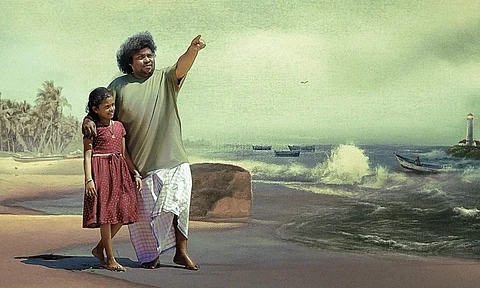

When Velu (a terrific Yogi Babu) is first asked to become the owner of the tea shop where he is employed, he shrugs and says, “Vida maataanga.” In that simple off-handed statement, Velu establishes that his present state in the social hierarchy isn’t for want of ambition, but the weight of oppression. This dichotomy is often seen in debut director Shan’s Bommai Nayagi where we see the protagonist standing up every single time he is pushed into the proverbial corner. But this fight against the system doesn’t come naturally to Velu, who wants his wife Kayal and daughter Bommai Nayagi to lead a safe and simple life. It isn’t like the first corner makes him revolt against the oppression. It isn’t even in the second or third but even the most patient among us has a breaking point. At a later point in Bommai Nayagi, Velu indeed becomes the owner of his own tea shop, but it is only after there is a mini revolution that facilitates the upgradation of his own ideologies. On the outset, Neelam Productions’ latest venture might be a seemingly simple film with not-so-lofty ambitions. However, Bommai Nayagi is anything but.
Cast: Yogi Babu, Srimathi, Aruldoss, GM Kumar
Director: Shan
The beautifully sung Kadarkara Kaathu introduces us to 2006 Cuddalore, and the life and times of Velu, his family, and his place in the imposed social hierarchy. In parallel, we see Jeeva (Harikrishna), who plays a man with leftist ideologies, and guides the oppressed to find their rights within the skewed system of Indian bureaucracy. On the other hand, we gradually understand that Bommai Nayagi is Velu's world. Thankfully, the makers do not make her a precocious child, and she is just made to be the 8-9 year old child she is. However, tragedy strikes when 2-3 men sexually assault Bommai Nayagi, who is rescued from them by her father. At this point, the worlds of Velu and Jeeva collide, and bring to the fore certain important talking points.
Can a father really autonomously decide what is justice for his daughter? Doesn't she get a say? Does the system provide the tools for members of economically and systemically oppressed sections to fight a long drawn legal battle? Will the system always protect the ones brave enough to fight against the powers to uphold justice?
Many such questions are posed by the makers through the plight of Velu and his family. While not all are answered, it is important that these questions are asked. Many a time, we see arguments asking people to never stop fighting for justice, but for how long. That is when Velu appeals to Jeeva and Co that he is tired of fighting the case, it made sense. Such scenes also act as a commentary on the adage of how justice will be served, even if it takes a long time. We also see how a basic legal knowledge is paramount. While Bommai Nayagi does point out these essential questions, the resolutions aren't really well etched out. All it takes Velu to change his mind about a lot of things is one passing statement, or a simple prod. These push the plot forward, for sure, but it feels rather archaic. In fact, Bommai Nayagi is constantly weighed down by these simplistic resolutions that are too predictable. Till an almost post-climactic last act, Bommai Nayagi follows very "been there seen that" beats. This isn't to say, Bommai Nayagi isn't engaging. Even when following similar beats, there are certain flourishes that elevate the film.
The primary highlight of the film is the top-notch casting. Yogi Babu and Subatra are terrific as the parents, and bring a lot of emotional heft to scenes without making a big hue and cry out of it. Points to Shan for making Yogi Babu say lines against body shaming, and also making him an object of desire. This normalisation is a very important step forward to break away from the shackles of stereotyping. It is lovely how the writing makes Velu react to things rather than acting upon it first. It is only in the last act that he actually does something out of his own volition instead of waiting for instructions or incidents to occur.
As I said earlier, Bommai Nayagi might seem like a rather simple film, but it is anything but. There are so many layers in the film, and it is interesting to see the multiple takeaways of the film. There is the importance of educating the girl child. There is the commentary on caste-based oppression. There is a scathing response to the concept of "honour." Through a wonderful dialogue, Velu questions the difference between justice and judgment. And the film doesn't shy away from showing how the gravity of the crime is lost on the perpetrators and their near and dear who uphold their feigned sense of caste supremacy. Bommai Nayagi is also a commentary on how sections of the police are more mediators and support the caste hierarchy. Such indictments are peppered throughout the film, which might be just telling a story about a father fighting for justice, but doesn't shy away from questioning the cracks in the system even if it provides him with temporary support and solace.
Somewhere during the pre-interval portions of Bommai Nayagi, we see a defiant Velu, who is standing outside his daughter’s classroom and clapping his hands vigorously as she says an English rhyme. When asked why he is clapping, Velu says, “Enna sonnaa nu therla, but nalla sonnaa la…” In some ways, Bommai Nayagi elicits a very similar reaction. We might not be sold by the rather straight-forward narrative or the one-note character arcs, or the predictability of it all… but nalla sollirkaanga la…